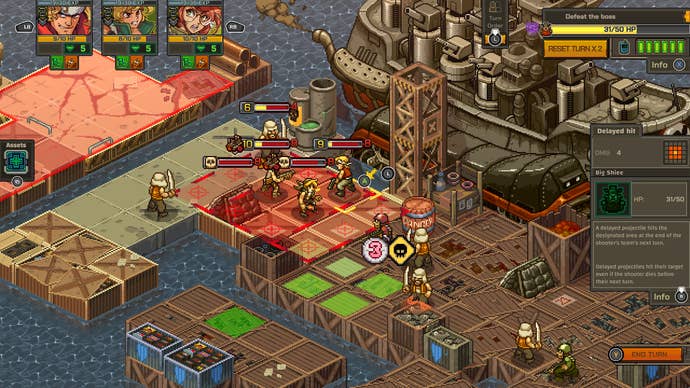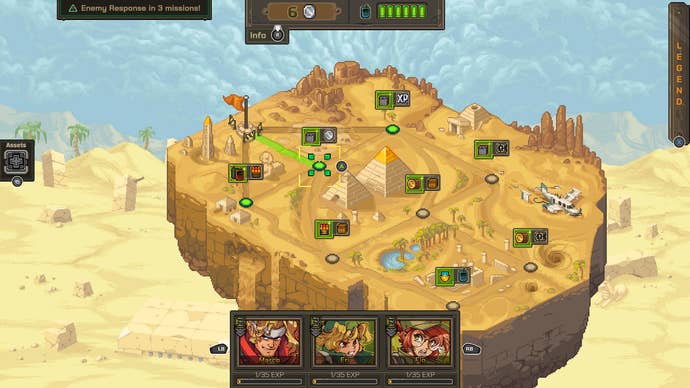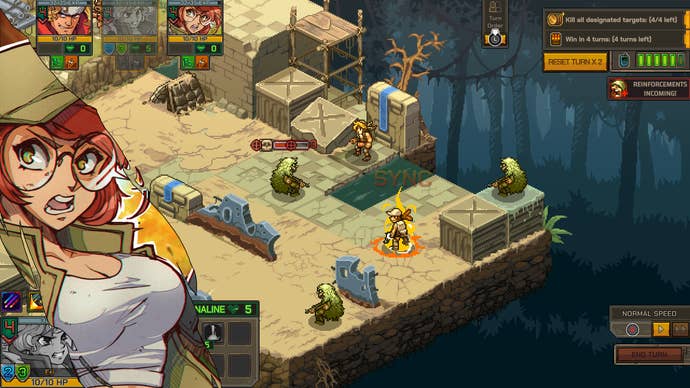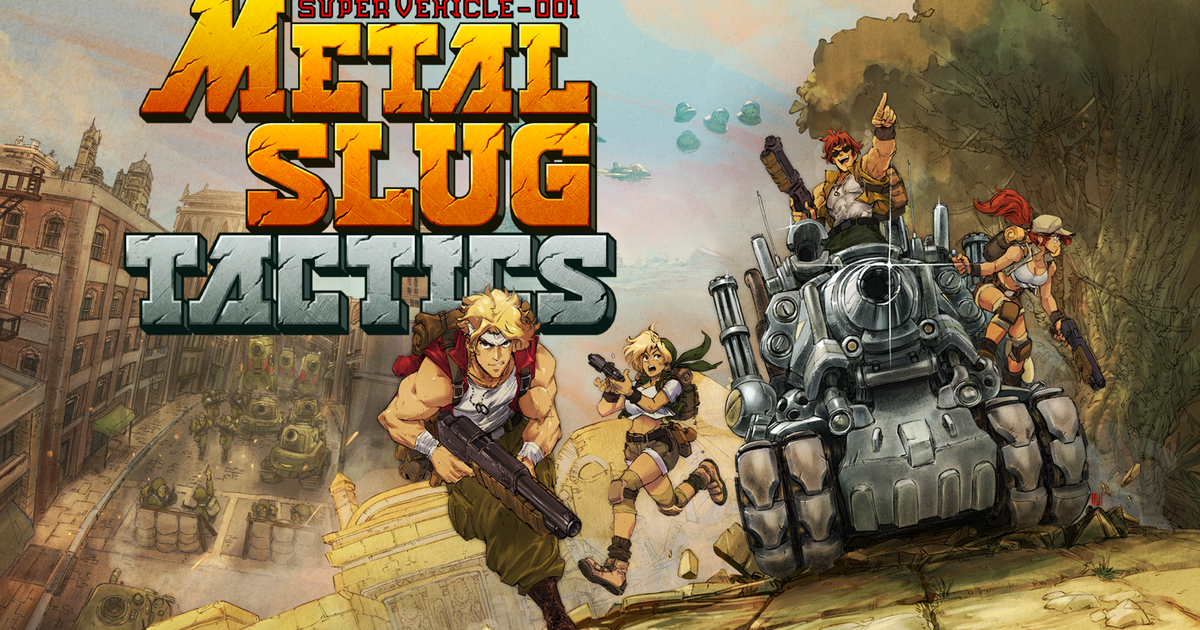Metal Slug Tactics gets many things right, but perhaps its most impressive achievement is that it isn’t bogged down nor limited by the IP it honors.
We’ve seen it happen time and again: “This is just like those original games you like but (x).” That’s not a bad recipe by any means, but it’s certainly one predestined not to leave a mark. That said, the reality is that, as good as it turned out to be, this Metal Slug spinoff is a niche release and won’t have much of an impact when all is said and done. Yet it tries really hard regardless to please its target audience with fresh twists on the tactical turn-based strategy formula and never takes the easy route.
Leikir Studio‘s post-Synergy early access game seems straightforward on the surface. You’ve got the classic isometric view, the tiles, the perfect military-themed lore for yet another take on the tactics subgenre. It looked like an easy win from the get-go, and the sharply pixeled visuals perfectly adapted that unmistakable Metal Slug aesthetic. Lesser developers would’ve just rolled with the basics and leaned hard on the iconic audiovisual presentation. But this ain’t an uninspired project. Quite the opposite.
Mind you, Metal Slug Tactics could’ve used some more time in the oven. Bugs plague some combat encounters, and the UI can get messy and opaque at times, not really letting you know whether a squad member will get cooked next turn or not. As clear and easy-to-grasp as its moment-to-moment mechanics and larger systems are, mayhap this roguelite turn-based game (yes, didn’t you know?) could’ve used a bit more testing on that front. All this is an easily fixable and minor annoyance once you fully realize with how awesome everything else is though.

The game’s first big win comes when the adequately thin tutorial highlights that Metal Slug Tactics is all about movement instead of turtling or finding the perfect position to attack and defend from, instantly turning most of the subgenre on its head. Sure, your characters (each with a distinct set of abilities and strengths) often need straight lines to land their shots and hits, but you’ll have to balance that with their need to move around the battlefield.
You see, skills are ‘fueled’ by adrenaline, and you earn that by moving them around as much as possible each turn, never staying put in one place. Even the characters will get annoyed when they’re not running around enough. It’s all Metal Slug-y like that; standing still was a quick way to get one-shotted in the difficult mainline 2D action game series. It’s a simple yet game-defining decision that makes very good use of the IP and how it’s behaved for decades elsewhere. Somehow, we don’t see this happening too often when developers are invited into someone else’s sandbox.

In the same way that Fire Emblem always was a perfect fit for the Musou genre, Metal Slug’s own setting and history always felt tailor-made for a solid tactics game. It’s finally arrived, but thankfully, it’s not a cheap cash-in. Even before getting into the actual battles (which can even turn into hasty escape missions due to some objectives), the world maps themselves and the small cutscene that takes the characters into the region overtaken by bad guys are brimming with charm that goes beyond getting the previously established art style right.
Gameplay twists go beyond the aforementioned adrenaline system and the need to scrounge for ammo ahead of boss fights if you’ve pulled the trigger of your big guns too much. Mummies (for example) turn the heroes into mummies in the same way they did in the original games. Far from a curse, this status only switches things up. Mummies suck at taking cover and moving quickly around, but deal massive damage with two different attack options. What could’ve been an annoyance or something to fear (like those bugs in XCOM) becomes a wrinkle that can be turned against the attackers themselves. It’s great stuff. Same applies to the titular metal slugs and other vehicles but in the opposite direction: They can be of great help, but also vulnerable in different ways.

There are more examples of the devs looking at what they were working with and picking the right Metal Slug element for the right game design idea, but spoiling everything would be a disservice to this little banger. It’s a thoughtful rework of everything that makes Metal Slug so good, and the fact it’s actually a highly replayable roguelite (cool unlocks and extra-punishing difficulty levels included) only makes it even better and more appealing to today’s mainstream crowd, so it’s a bit of a head-scratcher that marketing didn’t lean harder on that.
Maybe the fact it comes out swinging so hard with its own ideas and little quirks makes me a bit sad that it doesn’t have a bigger scope to adapt more of Metal Slug’s zanier bits, such as those irksome aliens and truly wonderful settings in later entries over outdated Middle East and ‘jungle native’ cliches. Who knows, maybe it’ll get juicy DLCs down the line. Personally, I think everyone involved (don’t forget Dotemu‘s efforts reviving old properties) nailed it so hard that Metal Slug Tactics could become a subseries rather than a one-off experiment, which is why I need you to buy/play it ASAP.
Metal Slug Tactics is now available on PC, Xbox consoles, PS4/5, and Nintendo Switch. It’s also part of Game Pass’ November offerings on both consoles and PC.
fbq('init', '1749355691872662');
fbq('track', 'PageView'); window.facebookPixelsDone = true;
window.dispatchEvent(new Event('BrockmanFacebookPixelsEnabled')); }
window.addEventListener('BrockmanTargetingCookiesAllowed', appendFacebookPixels);












Leave a Reply